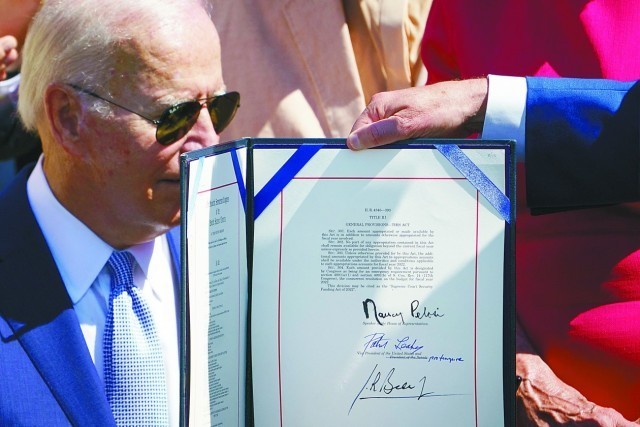Named "Block China" and forced the multi -country standing team!The US "Chip Act" is engaged in economic coercion
Author:China Youth Network Time:2022.08.13
[Global Times Special Journalist in the United States Yingchen Global Times reporter Zhao Jueyi Ren Tong] "We will invest in the United States. We will succeed in the United States. We will win the 21st century economic competition in the United States. On the 9th, the "2022 Chip and Science Act" was signed as the law, and this ambitious tweet was released. While providing huge subsidies to chip manufacturers in the United States, the bill requires these companies to agree to "do not develop precision chips in China." It is no wonder that the "Japan Economic Shimbun" referred to this bill to the United States' "Raising China Science and Technology Army Competition". Chinese Foreign Ministry spokesman Wang Wenbin rebuked on the 10th that the so -called "protection measures" of the law presented a strong geopolitical color, "it is another example of the United States for economic stress." Although Washington's trial of "accurate strikes" for the Chinese chip industry's "precise strikes" for the Chinese chip industry, there are almost no international mainstream media predicted that the United States can win this selfish chip war. The words of the Broadcasting Corporation (BBC) cited the professor of the London Institute of Political Science and Economics, Jin Kouyu's words expressed concerns: "I imagine a world, one divided into two, half of China's information system and infrastructure, and the other half uses American information systems and foundations in the United States Facilities, it will obviously have huge efficiency reduction. "

On August 9, local time, US President Biden signed the "2022 Chip and Science Act" in the White House. (Agence France -Presse)
If you want to subsidize China, you must "exclude China"
"More than 30 years ago, the United States had 40%of the global output of chips in the United States. Since then, our economic pillar is hollowed out in the United States manufacturing industry, and we let chip manufacturing overseas." Biden delivered a speech on the 9th when signing the "Chip and Science Act" "Now, this law brings the chip (manufacturing) back to the United States."
Biden clearly mentioned China in his speech at the signing ceremony. He said, "the Communist Party of China actively lobby US companies to oppose this bill is not surprising," and said that the United States "must lead the world in chip production." According to BBC, the current US chip supply has decreased from 40%of global supply in 1990 to 10%of the global share.
The "Nikkei Asian Review" said on the 10th that the passage of the United States "the most bold industry legislation in decades" marks the rare bipartisan cooperation in Washington. The New York Times commented that the Republican Party, which has always opposed the high degree of intervention of the government, supports the Democratic Act at this moment. In addition to supporting the American chip industry, "it is also to encircle China's chip industry."
According to the "Wall Street Journal" reported on the 10th, the bill is more than 1,000 pages. The most critical content of the bill is to allocate 52.7 billion US dollars for domestic manufacturing, of which 39 billion U.S. dollars are used for incentive plans, $ 11 billion for research and development, and Labor development plan. In addition, the government will also provide 25%of investment tax benefits for domestic chip factories in the United States, with an estimated cost of $ 24 billion. There are also about $ 200 billion for scientific research.
The Qatar Peninsula TV reported on the 9th that the bill also included the "important restrictions" required by Republicans and the China Eagle School, that is, companies applying for federal subsidies must promise not to develop precision chips in mainland China. The bill stipulates that companies that prohibit subsidies from significantly increased their production in China in China (generally considers chips below 28 nanometer), with a term of 10 years. Companies that violate the ban may be refunded all subsidies.
On August 9, chip manufacturer Meiguo announced that it would seek to obtain the federal subsidy. Micron said that it plans to invest 40 billion US dollars by 2030 to build a new chip manufacturer in the United States. The investment will increase the share of the United States in the global storage chip manufacturing industry from the current 2%to 10%. The chip giant Intel also said it will apply for subsidies to support its plans to build two chip factories in Ohio. The company will also seek subsidies for its expansion plan in Arizona's chip factory and New Mexico chip packaging factory. TSMC, the world's largest chip manufacturer, also said that it will seek subsidies for the construction of chip factories in Phoenix.
Forcibly change the global pattern of the chip industry
Li Yan, an associate researcher of the American Institute of Modern International Relations, told the Global Times reporter that the signing of this bill provides more bargaining chips for the United States with more international cooperation and negotiations. The United States may accelerate the construction of the so -called "chip alliance", Take industrial subsidies and market access as chips to draw South Korea, Japan and Taiwan, to form a "backyard" of the US chip industry.
BBC reported on the 9th that the bill in the bill industry in this bill made many chip companies facing the problem of "selection teams" between China and the United States. Because mainland China is the world's largest chip market, this "selection of side -by -side stations" has made TSMC, Samsung, Intel and other companies in dilemma. Samsung has a storage chip manufacturing plant in Xi'an. SK Houshi has a storage chip manufacturing plant in Wuxi and Dalian. Intel and Micron also have chip packaging and testing plants in China. Advanced process chips (its Nanjing factory produces 16 nanometer chips), "this is directly targeted in the" Chip and Science Act ". The BBC reports that in the past period, all American equipment manufacturers have received letters from the US Department of Commerce to inform them that they should not supply equipment for 14 nanometer or below chip manufacturing. According to the British "Financial Times" reported on the 10th, security officials in Taiwan are forcing Foxconn to abandon US $ 800 million investment in Mainland chip company Ziguang Group. Foxconn announced the investment last month, but a unnamed DPP authorities security officials claimed: "This will definitely not pass."
An unnamed industry insider said in an interview with the Global Times reporter that in recent years, the United States has adopted various means to create a chip "small circle" that crowded in mainland China, and the so -called "Chinese guardrail" clause in this chip bill It is seriously harmful to China and the entire industry. In the future, the United States may rely on this dominance that occupies the industrial chain and "to make whatever the country to produce", which may break the division of labor and pattern of the global chip industry.
The Chinese Embassy in the United States stated on the 9th that the bill was "resolutely opposed" and rebuked the "Cold War and Zero -sum game thinking." The China Trade Council and the China International Chamber of Commerce also issued a post on the 10th to express their opposition, arguing that the clauses in the bill treated some foreign companies, highlighting the use of government forcibly changing the international division of labor in the chip industry, which harmed the world including Sino -US enterprises The interests of enterprises in various countries. "This is the ultimate arms competition in the 21st century." The New York Times said on the 10th that "the motivation for business and geopolitics" urged China to create chips at the fastest speed, while the United States has "competitive motivation" to prevent China from preventing China from preventing China from being stopped in China. Get advanced technology.
"It's just copying the Chinese script"
The New York Times stated that shortly before the Act of the United States took effect, Chinese chip manufacturers had just achieved a major technical breakthrough, announcing the successful manufacturing of 7 -nanometer chips, "this surprised the world." The National Public Radio in the United States said on the 9th that the bill "may not be able to curb China's influence", and it may force China to "carry out greater independent innovation in chip manufacturing to catch up with the United States and its East Asia."
The United States Republican councilor who does not agree with the bill may just give more benefits that have given companies with high profits. "I know that the Democrats want to say that this is a competitive bill, but it is just copying the Chinese script." Republican Republican Republican Rogers said that in 2015, the Chinese government proposed the "Made in China 2025" action program that believed to China that it has the same as China. Ten high -tech industries with long -term strategic value invest or subsidize, the Bayeng government is now trying to "spend more than China." The "Nikkei Asian Review" states that China has invested $ 150 billion for the chip industry. TSMC stated that it plans to invest 100 billion US dollars within 3 years to expand its manufacturing capabilities. The European Union is also making legislation for its own chip. Therefore, the "Chip and Science Act" may not bring "earth -shaking changes."
"None of those American multinational companies that are well known now depend on government subsidies, including Intel." Taiwan Zhongshi News Network said on the 10th. According to Boston Consulting, if Washington adopts a "technical decourse" policy for China, it may even harm the interests of some American chip companies, or it will lose 18%of the global market share and 37%income, and decreases by 15,000 To 40,000 high -skilled jobs. In other words, the subsidies provided by the "Chip and Science Act" are likely to be unable to make up for the cost of the chip company to move the factory from China to the United States.
Zhang Zhongmou, the founder of TSMC, said that the cost of the same chip in the United States is "about 50 % higher than that in Taiwan". He said that the United States strives to increase the local chip manufacturing industry, "it is futile, wasteful and very expensive." Koril, a risk management expert at the University of Virginia, told CNN on the 9th that no matter how efforts to support their own manufacturing bases, it is impossible to decompose with the global supply chain, especially the design, manufacturing and raw materials of chips are distributed in multiple Different countries and regions, "this is a huge network. No matter how hard the country strives to localize the manufacturing industry, it is inevitable to depend on each other."
Source: Global Times
- END -
China Enterprise undertakes the opening of Belgrade's around the city section, and Wu Jiqi praised: "If you want to be rich, build the road first"

According to the Serbian B92 TV website, the Belgrade B5 bidding section was offic...
Secretary -General of NATO: peace is possible, depending on how much Ukraine is willing to compromis

According to today's Russian TV (RT) reported on the 12th, NATO Secretary -General...